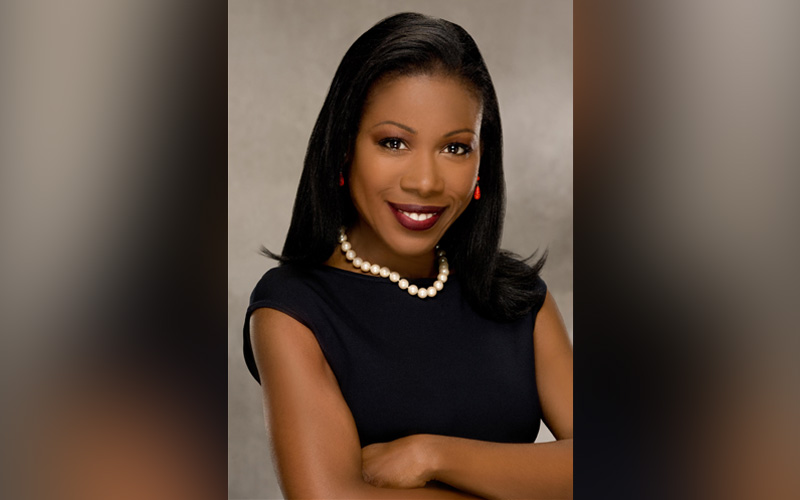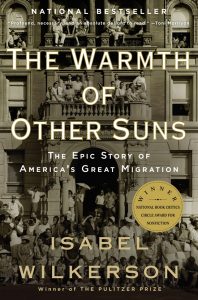
By Latanya West, San Diego Voice & Viewpoint
Isabel Wilkerson, author of “The Warmth of Other Suns,” recently discussed her novel, the Great Migration, and San Diego’s role in her the epic tale of the Great Migration of African Americans from the American South to northern cities across the U.S. On February 23 Wilkerson gave a rousing, thought provoking keynote speech at UCSD’s annual Black History Month Scholarship Luncheon.
 Q: How is San Diego such a significant part of the Great Migration and your journey in writing “The Warmth of Other Suns”?
Q: How is San Diego such a significant part of the Great Migration and your journey in writing “The Warmth of Other Suns”?
A: It’s significant for this book in particular because one of the main protagonists, Dr. Robert Joseph Pershing Foster, migrated from Monroe, Louisiana to California and it was a heartbreaking journey through the desert. Through the mountains. When he got to Arizona, he thought that he’d be able to stop and get a room wherever he chose. He had been preparing and knew that [his journey to California] would be difficult. He wouldn’t have even have dreamed to try in Louisiana, or Texas, which was a huge state. He knew not to even think about getting a room there.
But, by the time he got to Arizona he felt that it would be open enough to get a room anywhere. And, he tried, and was crushed to have discovered that after all of this long drive, he still was, in that moment, no better off than if he had even have been in Louisiana at that point. So then he had to drive through the mountains and the desert, at night, and that was even more exhausting than it otherwise would have been because he had been planning his trip so that he would sleep [in Arizona] from the long drive. So he almost fell asleep at the wheel. He was disheartened, he was crestfallen and he was sleepy and dog-tired and so he had to push through.
So I replicated that journey – I drove the entire journey – and I had my parents with me in the car – who had been, as I had described [in the book], survivors of Jim Crow. They were both from the South and knew what it was like to drive in the way he had been forced to.
I was replicating it to the letter so that, if he wasn’t able to stop, I wasn’t stopping.
So there’s Phoenix, and I continue on and I’m tired because I’m following the same trail he did to the letter. We got to those hairpin turns in the desert at night and something that says “Gas 180 Miles Ahead.” So, I almost fell asleep at the wheel, sort of veering across lanes and [my parents] said, at a certain point, “You need to just stop the car or let us out. This is dangerous, we went through this before, there’s no need…”
I was feeling I need to feel exactly as he felt. We ended up having to stop in Yuma, Arizona. They insisted. We took up the journey the next day.
Foster had lived with this for decades. He would never forget this journey because it had been so difficult for him. As he described it to me – and I experienced [it] – arriving in San Diego. That was ultimately his first actual arrival in the “New World” known as California.
That’s why San Diego is central.
We came into the older part of town, as he had. So it was very central and the idea of arriving in the early morning hours. Also, he had described that he had a choice between San Diego one direction and Los Angeles another, and he said he chose San Diego because it was the closer [of the two]. He was just so tired. He was so exhausted. He actually stopped the car here for the first time. He was too afraid at that point to stop [anywhere else], he had lost faith at that moment and that’s why San Diego is just so central. I was doing it so I could tell his story with as much emotional accuracy as possible. He had described it many many times. I had talked with him, recorded him, spoken with him many many times. We went over this over and over again. He said, “Every single decision I made, what people’s reactions were, what more could I have done?” He was dressing formally, he was wearing a suit jacket, so there was literally nothing he could have done [differently]. It stayed with him, it weighed on him and he never made that journey again by car because of how crushing it had been.
Q What is your mandate now that you’ve written the book?
A. My mission is about reminding us of how much we all have in common and that the experiences and history of people of african descent in this country is not ‘African American History,’ it’s American History. The experiences African Americans have had, for example in the Great Migration is similar to those that other people have had. It’s a way to bridge the gulf in how people see themselves compared to others – which is the source of all divisions – you don’t see yourself in someone else, you have no empathy for someone else whose experience is different from yours. Well, no, the record and the scholarship shows that there’s a migration age, African Americans were no different in that. They followed predictable paths, as in any other migration. These are portals to understanding. That’s really how I look at it
Q. What is your advice to San Diegans seeking their roots?
A. Go to the oldest person in your family and open your heart to their experiences and make it safe for them to talk. The generation that were survivors of Jim Crow often do not talk – because they experienced post-traumatic stress. It’s like PTSD out of a war experience and they didn’t want to burden their own children with what they had endured. One of the reasons I wanted to do this book is because not enough people recognized the magnitude of the experience. They didn’t even know the phenomena had a name, they didn’t connect themselves with it. A lot of descendants of those who survived Jim Crow feel embarrassment that their ancestors had been sharecroppers or domestics. This is a reclaiming of the history, a reclaiming of the tools of survival that they had to harness in order to make it possible for us to even exist. I think they deserve our attention, our gratitude, our recognition of the heroic, quiet sacrifices they made.

